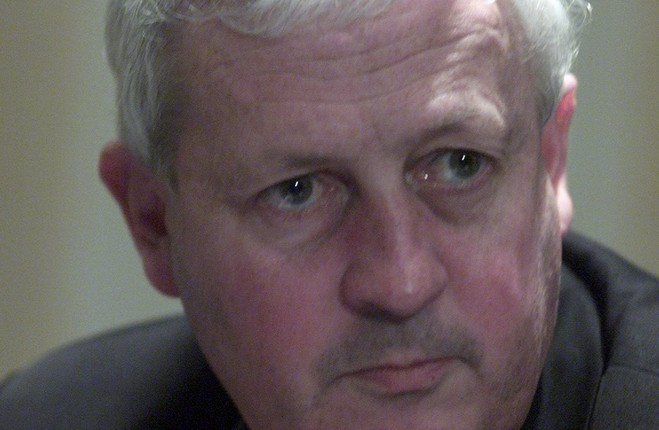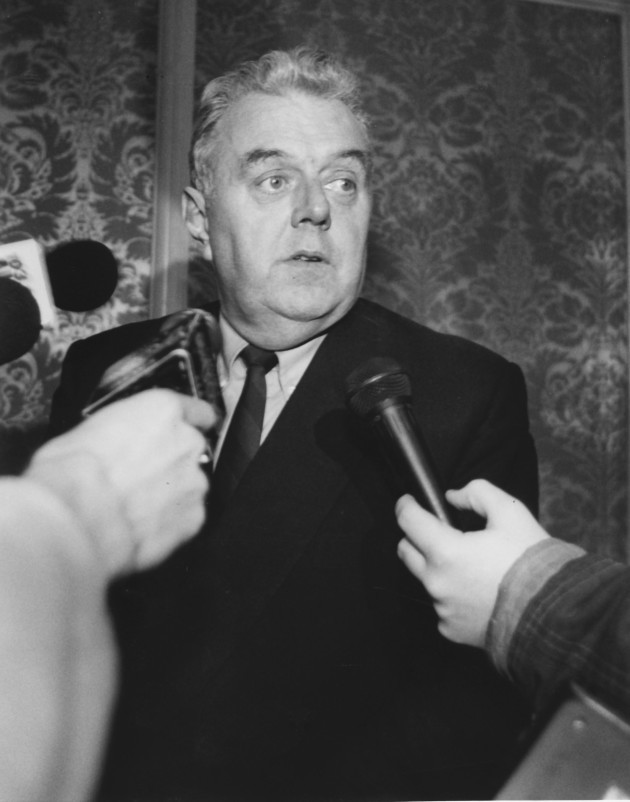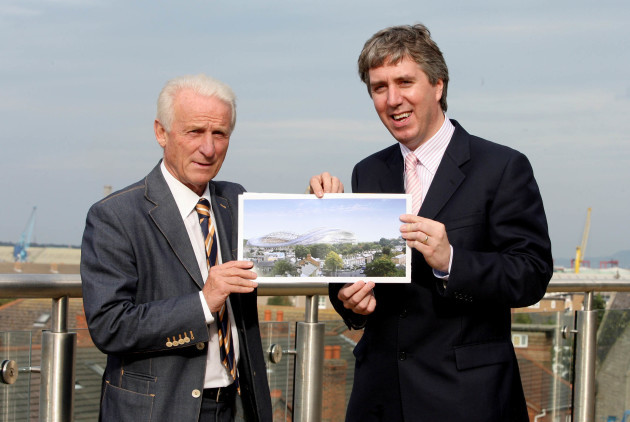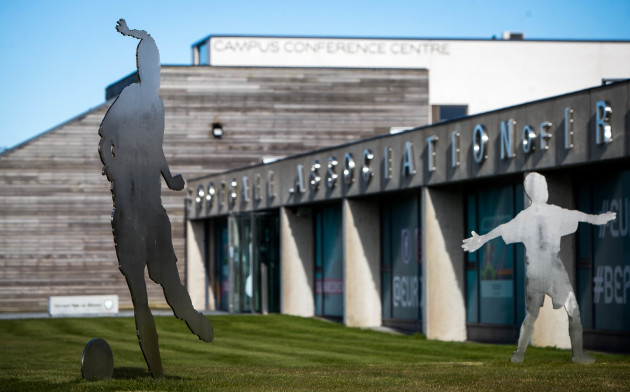N.B. The FAI’s financial accounts for 2019 were released after this interview was conducted (more details here).
ANYONE WHO HAS read ‘Champagne Football’ — the acclaimed book by Mark Tighe and Paul Rowan on John Delaney’s rise and fall released earlier this year — will know that the name Brendan Menton features prominently in its early pages.
Menton was Honorary Treasurer of the Football Association of Ireland between 1996 and 2000, before graduating to the role of General Secretary between 2000 and 2002.
He arrived in the treasurer role on an interim basis, just after leaving a job with AIB, close to another turbulent time in the FAI’s history, when a World Cup ticketing controversy resulted in the departure of Joe Delaney — father of John — as well as a number of others in the embattled association.
Menton’s departure, meanwhile, took place in the wake of the damning Genesis report, which criticised Ireland’s preparation for the 2002 World Cup and the lack of professionalism within the set-up. And just as Mention arrived close to Joe stepping down, his exit occurred around the time John Delaney was quickly rising up the ranks of the association.
“Did I regret resigning? No, I couldn’t survive in that environment,” he tells The42. “Petty politics was going on all the time. I was being undermined and I knew it. I had better things to do with my life.
If you don’t enjoy what you’re doing and I was no longer enjoying what I was doing, if I’d stayed on as Honorary Treasurer, [Delaney] would have undermined me sooner or later.”
‘Champagne Football’ details how during his time as General Secretary, Menton was undermined by Delaney. For example, citing an affidavit sworn by Mick McCarthy’s agent Liam Gaskin, it explains how when Ireland were on the verge of qualifying for the knockout stages of the 2002 World Cup, without the consent or knowledge of others in the FAI, then-Honorary Treasurer Delaney offered the Irish manager a £100,000 ‘exceptional performance bonus’.
McCarthy had previously all but agreed a new contract with the FAI, though didn’t yet have time to officially sign it amidst a busy schedule.
As Menton writes in his own book ‘Beyond the Green Door,’ which documents his six years in the FAI: “Imagine our surprise at the subsequent officers’ meeting on 10 June when Delaney stated it was his information that Mick McCarthy would not sign the contract without the payment of an additional bonus for exceptional performance.”
Of course, when Ireland’s fortunes promptly went downhill after the 2002 World Cup, it was Menton that received much of the flak from critics, who wrongly assumed he had been primarily responsible for the £100,000 bonus payment.
After leaving the FAI, Menton undertook a role in Asian football as Director of Member Associations between 2003 and 2009, before working as a Fifa consultant up until 2014.
He attracted headlines again last year, when he started blogging on Medium about the various FAI-related controversies that were emerging.
Was he surprised when the revelations began to surface?
“I had seen reports of the financial accounts of the association on occasion,” he says. “Someone was ringing asking me for comments over the years — even when I was abroad, I used to see it.
“I’m not an accountant, but I was president of the association, so I understand the association’s accounts. I always knew that the debt situation was being underplayed.
“The focus was the bank debt is this, the bank debt is that. But it’s not the bank debt, it’s the total liabilities of the association you need to look at and they were always very much higher and weren’t really coming down. That’s even before they had to be re-stated in 2017 and 2018.
“So I wasn’t surprised that the association was in financial turmoil.”
In recent times, the FAI has employed around 200 people, whereas Menton says the number was closer to 50 during his era.
He cites disappointing attendances and results in matches involving the senior team as a substantial part of the problem.
“The FAI has never done a successful ticket deal. The Vantage Club was a disaster. This idea that suddenly, people would write big cheques for 10-year tickets… For me it was never going to add up.”
Menton says he was more surprised by the controversies regarding expenses.
“The financial [man] during my time was Peter Buckley — he was good, he was a stickler. There had to be a report on credit cards, you weren’t allowed to use them for personal expenses. If you perchance did, the cheque had to be returned.
“There was an internal audit committee, there was a finance committee, there was quarterly management accounts from the finance committee that went to the board.
All of these things seemed to have been [effective]. I’m not saying the FAI was a perfectly run organisation, but there were financial controls and policies in there, which seem to have been unwound. How was that allowed to happen?
“The FAI was a very political organisation. If you weren’t involved in the politics, you weren’t going to survive in there. There are some people in there who have a genuine interest in football and its progress. But a lot of people [think]: ‘If I’m on council I can get tickets for the international matches, the away games, I get invited to this dinner, I go up to this committee, stay overnight and have a few pints and get expenses. In the end, with a few people, it must be the gravy train, it drops crumbs from the master’s table. That seemed to be more important for people, rather than doing what was right for football, which was the reason they were on council, the committee, the board or whatever.”
Menton is also critical of Sport Ireland’s handling of the saga.
“I know they say they’re not regulatory, they’re development, but come on! Who is supposed to be regulating these organisations?
After the event, it’s easy to [enforce punishments] and put in the governance review. But part of the development of an organisation, it’s the governance and corporate development of the organisation. So they did have a responsibility. Did they even ask why does the FAI need an advance on its grant payments every year? They just approved it.”
Aside from Saipan, perhaps the biggest talking point of Menton’s time as General Secretary was the potential building of a new national soccer stadium, with Eircom Park and the Bertie Bowl among the proposals, though he was firmly against the idea.
“What we needed was €130 million to build Eircom Park. And we were going to give away our television money for 50 years to finance it.
“Delaney says he led the charge against Eircom Park — that’s reinventing history, he didn’t.
“The charge was led by John Byrne, myself, Kevin Fahy, Maurice Fleming and Ray Gallagher. Delaney came late to that group. That was the year 2000. It died.
“Eight years later, he would say the FAI can’t afford to fund it and [set up] nearly a bigger project. And basically the same financial strategy that had failed in the late ’90s — advance sales of tickets.
“With Eircom Park, I never had a single regret. I think the Aviva Stadium thing has re-proven that I was right in my stances as treasurer. I just couldn’t see how we could fund it. ‘Oh well, in 10 years’ time, re-sell the tickets. Then we’ll have money for development.’ But what’s going to happen in the 10 years and what happens if we don’t sell the tickets?”
In addition, of all the controversy that transpired in the years following his departure, Menton says:
“On page 356 of my book, [it’s written that] ‘four directors acting in concert can now properly control the FAI. I am sure this is being worked on.’ I wrote that in 2003. And that’s what came to pass. The first thing it did was reduce the number on the board, but it upset the balance between the senior game, the League of Ireland became powerless, they gave all the control and the power to the junior game and the provincial associations, which in my view should have no real function in the modern game.
“So four directors acting in concert could control the FAI and it came down to three — Delaney, [Michael] Cody and [Eddie] Murray.
“The FAI is a company limited by guarantee, so the directors of a corporate entity, they have a fiduciary duty to the company and they reneged on it. People like Brendan Dillon didn’t. He stood up and asked questions, but was isolated and said ‘if that’s the way it’s going to be, I have better things to do with my life’.
“But that’s how it came to pass and the other thing is, back in the day, the Chief Executive or General Secretary wasn’t a voting member of the board — that’s something Fifa specify. But again, the Genesis report said the Chief Executive should be a voting member of the board, so that focused too much power in one hand.
“He eventually took total control of the association. The people who were the Honorary Secretary or on the board were mainly people he would have approved of. There was no real competition for places or positions within the FAI.”
While there have been significant changes made in the association over the past year, Menton believes there are still structural flaws and as a consequence, he is not optimistic about the future of Irish football.
“It’s a top-down organisation. The FAI should be a bottom-up organisation with the clubs at the bottom, but only 50-60 clubs go to the AGM out of 200 votes. It’s built for people to sit in there, warm the seat, get the perks, nod your head and even the governance review report is inadequate.
“The clubs are the base members of the association and they should have a lot more power and influence.
“I think the political reforms are totally inadequate. There are a lot of promises in the governance review and in various other things.
“I along with two other people [Packie Bonner and John Byrne, according to Champagne Football] met with Shane Ross shortly before the Memorandum of Understanding. We were worried about the lack of political reform within the structures of the association.
There are a lot of lip service to ‘oh this needs to be changed’ and the constitution needs to be updated, I don’t see any radical change happening.
“And because of that, I’m pessimistic that nothing will fundamentally change within the FAI as an organisation.
“The trouble is, there are very good people in football, but by and large, they don’t get involved in the FAI. They run their clubs, they run their own leagues.
“I could name four people involved in football, who have the same level of expertise and competence as the four independent directors. But the structures of the FAI prevent them [getting involved]. Because they’d have to serve on a league committee for 10 years, before they go to a provincial committee and they have to serve another 10 years on the provincial committee, before they can even stand for a council seat on the FAI, or to be nominated as a delegate to go to the AGM.”
And so what are the necessary changes required as Menton would see it?
“We need to build the organisation from the bottom up, starting with the clubs. I would say that every club who has x number of teams registered in official competitions should be entitled to go to the AGM.
“I think the provincial associations should be abolished. And everyone elected on the board, they should be elected by the members en masse. They shouldn’t be pigeonholed into one from Munster, one from schoolboys — then it becomes a much more democratic organisation.”
Menton retains an interest in Irish football these days in his role as a trustee at Home Farm FC — the club co-founded by his father, Brendan Menton Sr, in 1928.
He remains sceptical as to whether the FAI can escape from their current financial mess — the extent of which was revealed a year ago.
“The total liabilities, which is the figure I focus on, was €85 million [according to the figures released] in December 2019. It’s going to be higher when the accounts for 2019 come out. And given Covid, it’s likely to be even higher again in December 2020, despite the government bail-out. Their income has been shot.
“So are we looking at liabilities of around €100 million? How are they going to pay those back? Even if the association goes back into profitability and makes €5 million a year, which is not bad — the turnover is less than €50 million [it was officially €44.8 million in 2018 and €49 million in 2017]. That’s going to take 20 years or longer [to pay off] those liabilities.”
So does Menton fear for the organisation’s future?
“I would be concerned. The government rescue deal bought them four years. Even some of that money was to be loaned.
“So with the extent of the liabilities, I’d love to see their financial plan of how they’re going to pay down the debt. Probably the first call is the bank.
“Back in the day, we looked at qualification as a bonus. 2002 was the first time since 1994 and we probably made €5-7 million extra on that. It’s now increased and I know the Uefa TV deals are more generous. But you’d even begin to wonder, what’s the future for football on television? Are the revenues going to be the same? I don’t know.
I thought even with the rescue deal, okay, it gives them a chance. Now Covid has come in on top of it, I think it’s reduced those chances.
“It’ll be interesting to see when the 2019 accounts come out and even more in a few months’ time when the 2020 accounts come out. Just to see what the true financial position is.”
He continues: “So what has the impact of all this been on football? It’s been financially horrendous on the FAI. But again, the strength of the game is the clubs. The clubs will survive, prosper, develop, do their own thing. This idea that with the clubs, no development would have happened if John Delaney hadn’t given €5000, is a nonsense.
“We’ve been spending a lot of money on development in Home Farm in the last few years, and we haven’t got a penny from the FAI. It’s the Sports Capital Programme and it’s local community fundraising that funds football. The FAI grants, which were about €1 million a year, that hasn’t really changed over the last few years, they’re a pittance in the context of what the clubs are doing.”




